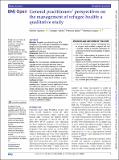Files in this item
General practitioners’ perspectives on the management of refugee health : a qualitative study
Item metadata
| dc.contributor.author | Davison, Rachel | |
| dc.contributor.author | Hobbs, Megan | |
| dc.contributor.author | Quirk, Frances | |
| dc.contributor.author | Guppy, Michelle | |
| dc.date.accessioned | 2023-04-05T10:30:20Z | |
| dc.date.available | 2023-04-05T10:30:20Z | |
| dc.date.issued | 2023-03-24 | |
| dc.identifier | 283995523 | |
| dc.identifier | 35800d05-eb56-41da-882b-da564fe3437a | |
| dc.identifier | 85151044950 | |
| dc.identifier.citation | Davison , R , Hobbs , M , Quirk , F & Guppy , M 2023 , ' General practitioners’ perspectives on the management of refugee health : a qualitative study ' , BMJ Open , vol. 13 , no. 3 , e068986 . https://doi.org/10.1136/bmjopen-2022-068986 | en |
| dc.identifier.issn | 2044-6055 | |
| dc.identifier.other | Jisc: 989656 | |
| dc.identifier.other | publisher-id: bmjopen-2022-068986 | |
| dc.identifier.uri | https://hdl.handle.net/10023/27341 | |
| dc.description.abstract | Objective To explore general practitioners’ (GPs) perceptions of the challenges and facilitators to managing refugee healthcare needs in regional Australia. Setting A regional community in Australia involved in the resettlement of refugees. Participants Nine GPs from five practices in the region. Design A qualitative study based on semistructured interviews conducted between September and November 2020. Results The main challenges identified surrounded language and communication difficulties, cultural differences and health literacy and regional workforce shortages. The main facilitators were clinical and community supports, including refugee health nurses and trauma counselling services. Personal benefits experienced by GPs such as positive relationships, satisfaction and broadening scope of practice further facilitated ongoing healthcare provision. Conclusions Overall, GPs were generally positive about providing care to refugees. However, significant challenges were expressed, particularly surrounding language, culture and resources. These barriers were compounded by the regional location. This highlights the need for preplanning and consultation with healthcare providers in the community both prior to and during the settlement of refugees as well as ongoing support proportional to the increase in settlement numbers. | |
| dc.format.extent | 9 | |
| dc.format.extent | 328975 | |
| dc.language.iso | eng | |
| dc.relation.ispartof | BMJ Open | en |
| dc.subject | RA0421 Public health. Hygiene. Preventive Medicine | en |
| dc.subject | E-DAS | en |
| dc.subject | SDG 3 - Good Health and Well-being | en |
| dc.subject | SDG 16 - Peace, Justice and Strong Institutions | en |
| dc.subject | MCC | en |
| dc.subject.lcc | RA0421 | en |
| dc.title | General practitioners’ perspectives on the management of refugee health : a qualitative study | en |
| dc.type | Journal article | en |
| dc.contributor.institution | University of St Andrews. Arctic Research Centre | en |
| dc.contributor.institution | University of St Andrews. School of Medicine | en |
| dc.contributor.institution | University of St Andrews. Population and Behavioural Science Division | en |
| dc.identifier.doi | https://doi.org/10.1136/bmjopen-2022-068986 | |
| dc.description.status | Peer reviewed | en |
This item appears in the following Collection(s)
Items in the St Andrews Research Repository are protected by copyright, with all rights reserved, unless otherwise indicated.

